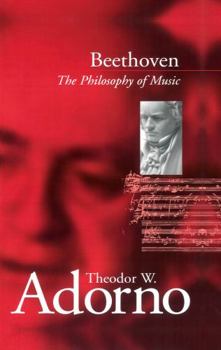Beethoven: The Philosophy of Music
Select Format
Select Condition 
Book Overview
Beethoven is a classic study of the composer's music, written by one of the most important thinkers of our time. Throughout his life, Adorno wrote extensive notes, essay fragments and aides-memoires on the subject of Beethoven's music. This book brings together all of Beethoven's music in relation to the society in which he lived. Adorno identifies three periods in Beethoven's work, arguing that the thematic unity of the first and second periods begins to break down in the third. Adorno follows this progressive disintegration of organic unity in the classical music of Beethoven and his contemporaries, linking it with the rationality and monopolistic nature of modern society. Beethoven will be welcomed by students and researchers in a wide range of disciplines - philosophy, sociology, music and history - and by anyone interested in the life of the composer.
Format:Paperback
Language:English
ISBN:0745630456
ISBN13:9780745630458
Release Date:September 2002
Publisher:Polity Press
Length:288 Pages
Weight:3.25 lbs.
Dimensions:0.6" x 6.0" x 9.0"
Customer Reviews
1 rating
Adorno returns Beethoven,as if the ink never dried
Published by Thriftbooks.com User , 25 years ago
Of all the composers Adorno has thought about intensely, writing essays which merged into book lengths on Mahler,Berg, or Wagner, as well as countless articles and essays on music, Beethoven seems to be a high special preserve within his body of work. This is a work of fragments, and notes,incomplete thoughts collected into notebooks throughout Adorno's life which never was able to solidify under one leaf,or merge into a completed work. But if you've read his brilliant and overwhelming intellectual discourses in his "Philosophy of Modern Music" or "Negative Dialectics" or lastly, his posthumous "Aesthetic Theory" this is more a threshold unto perhaps Adorno's working methods, unformed thoughts and frequent postponments of thoughts, concepts and directions to be takened up later,perhaps for the reader to fulfill. Beethoven was the consummate artist, one committed to the musical subject,the continuation of time, a composer who sought to break rules as well as follow them. And in following them there is a liberation for what this allows,sometimes new forms,a breakage of the tonal scheme or creating a piano sound almost provincial yet innovative,as the "Waldstein Sonata". Adorno frequently draws on Beethoven the craftman, the manipulator and purveyor of materials, on tonality,motives,variations, and form in a state of becoming, and makes us aware once again, that the process of music is a time-bound one, one of an incessant durational frame. Beethoven dealt with first and foremost with reprisals, with materials, themes and harmonic schemes we have heard and will hear again. He dealt with something which is already in the world, and his music simply deals with the inevitability of those moments and their fate redemption or demise. Late Beethoven as well we learn was not a state of increased polyphonic complexity, "Missa Solemnis" was a retrogressive act,not one of innovation as his "Piano Sonatas" frequently were. Adorno reminds us of the dimensions of Beethoven's art we seem to forget,as the simplified moments, the economy of means reduced to pure power as the "Ninth Symphony" or reduction of subjectivity as the late "Sonatas" proclaims. The Late Music "Spatstil" was a music of reduction of harmonic schemes beginning too soon as the late "Quartets" the "C# minor". The editor here Rolf Tiedemann long an Adorno executor trys to make the fragmentariness of this incomplete work cohere with copious notes placed at the end, even interjecting excerpts from completed essays and entire works, as "Aesthetic Theory". Although useful I found this distracting and not all that absorbing.It seems we've never understood Beethoven or that the dimensions of his creativity have been layered,Adorno returns him back to a composer status, a contemporary or visitor of the postmodern field as if the ink never dried.





